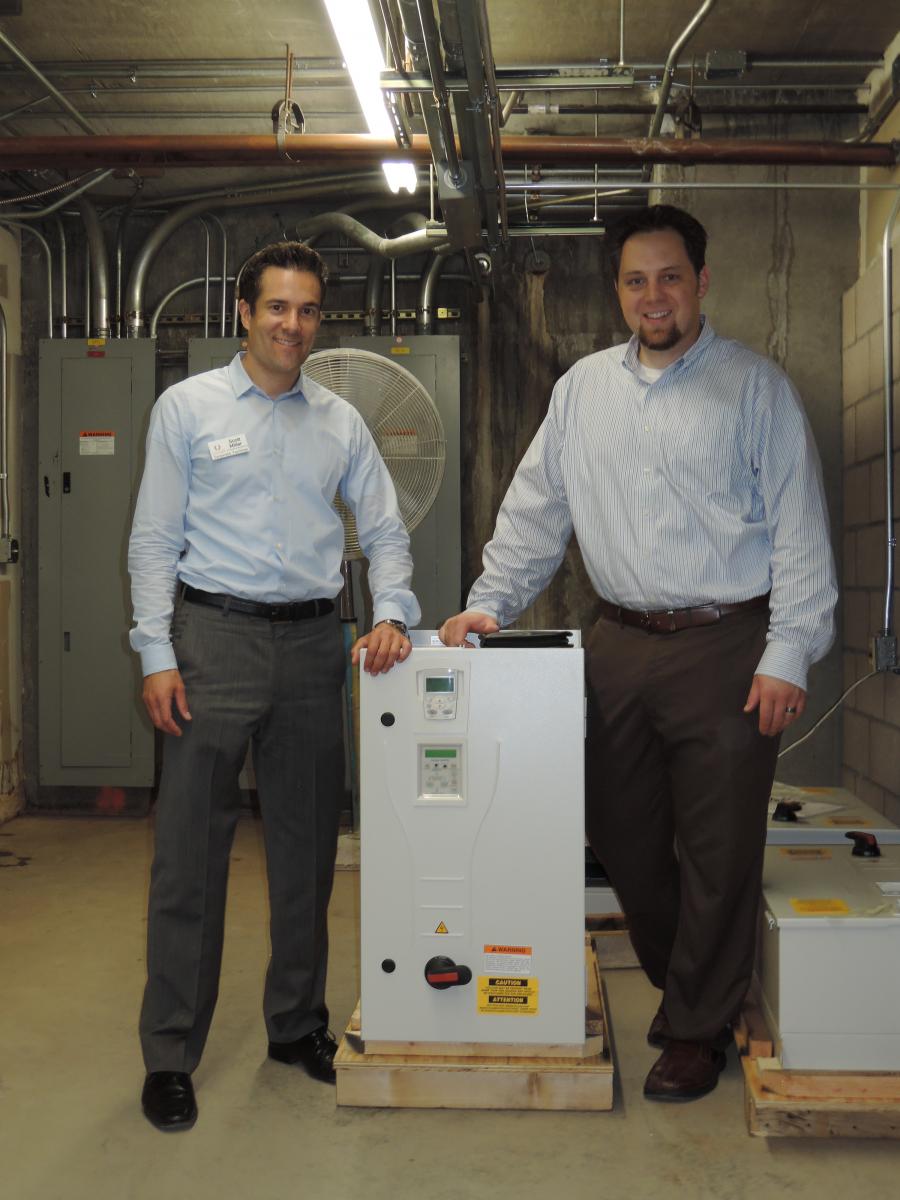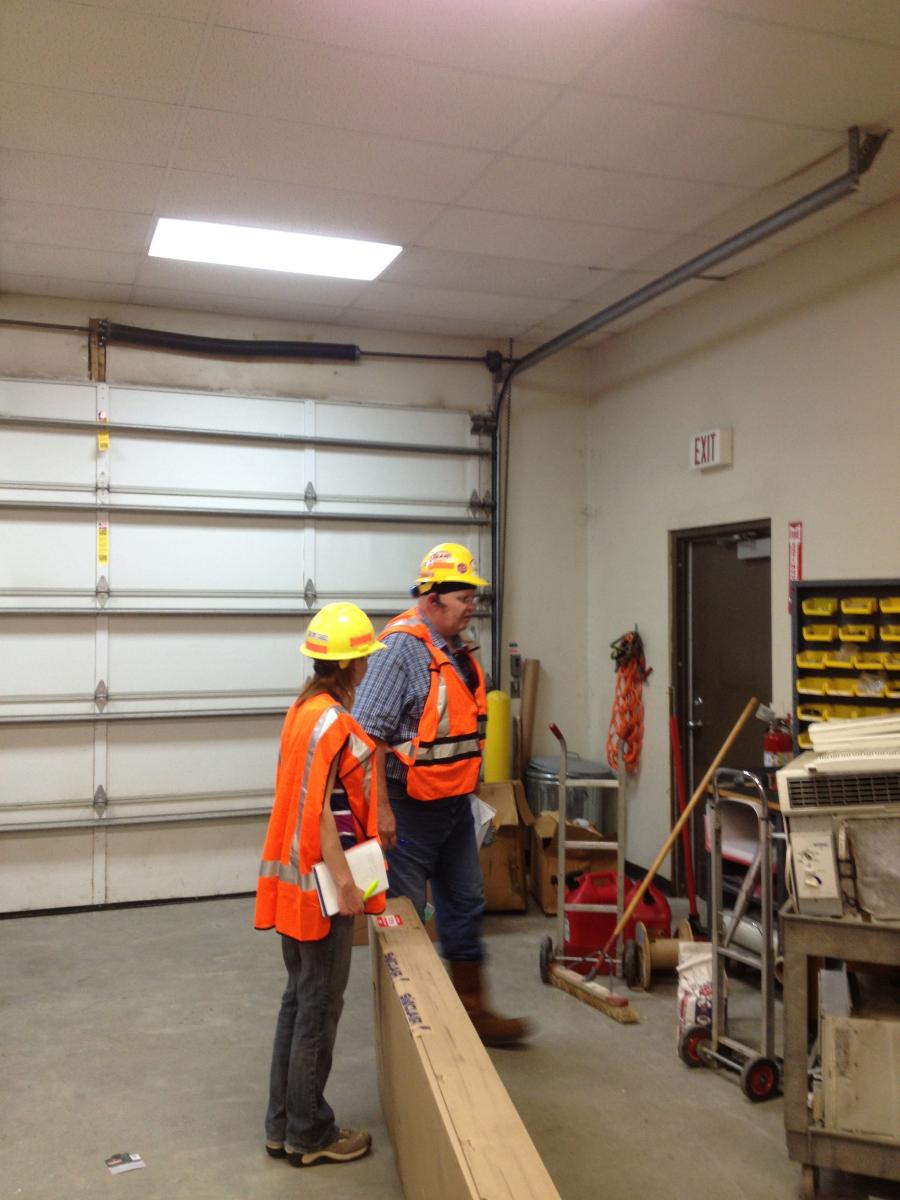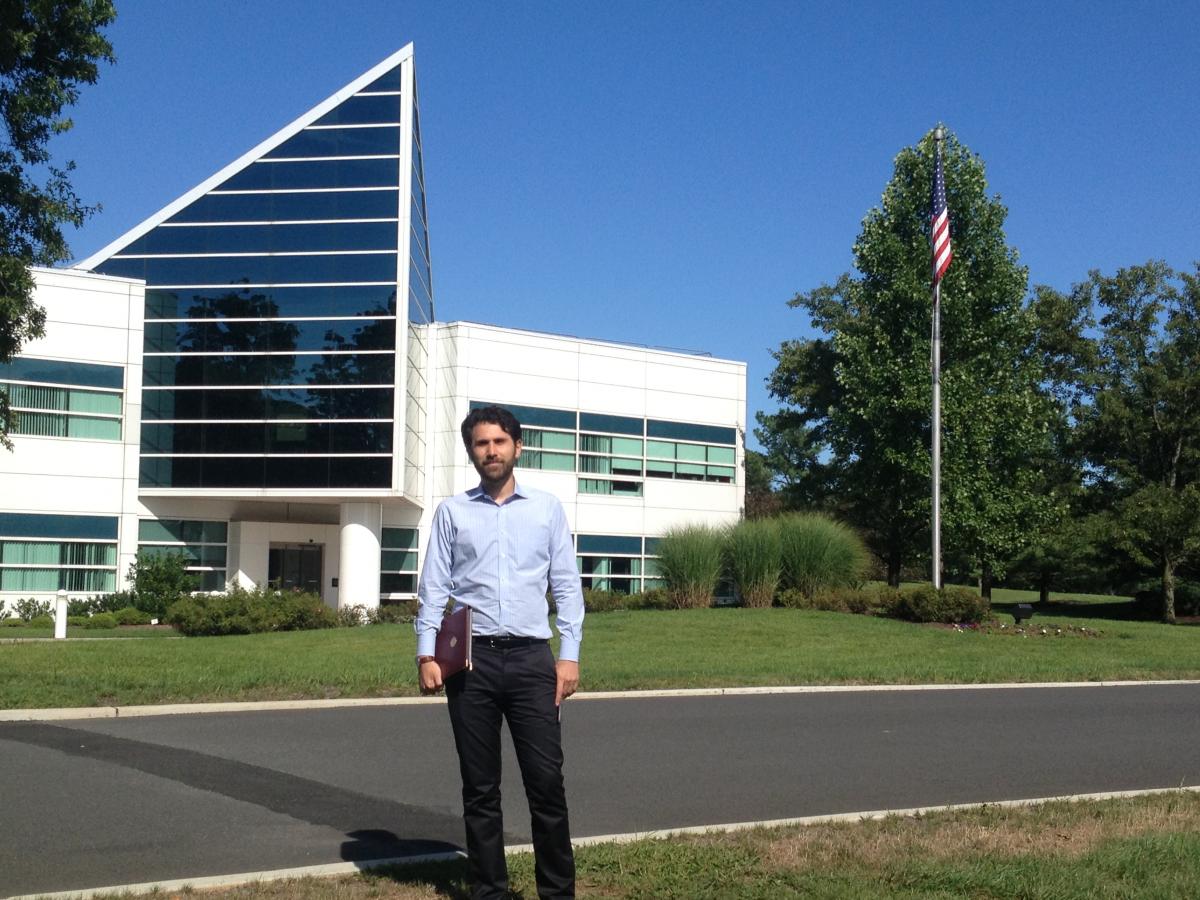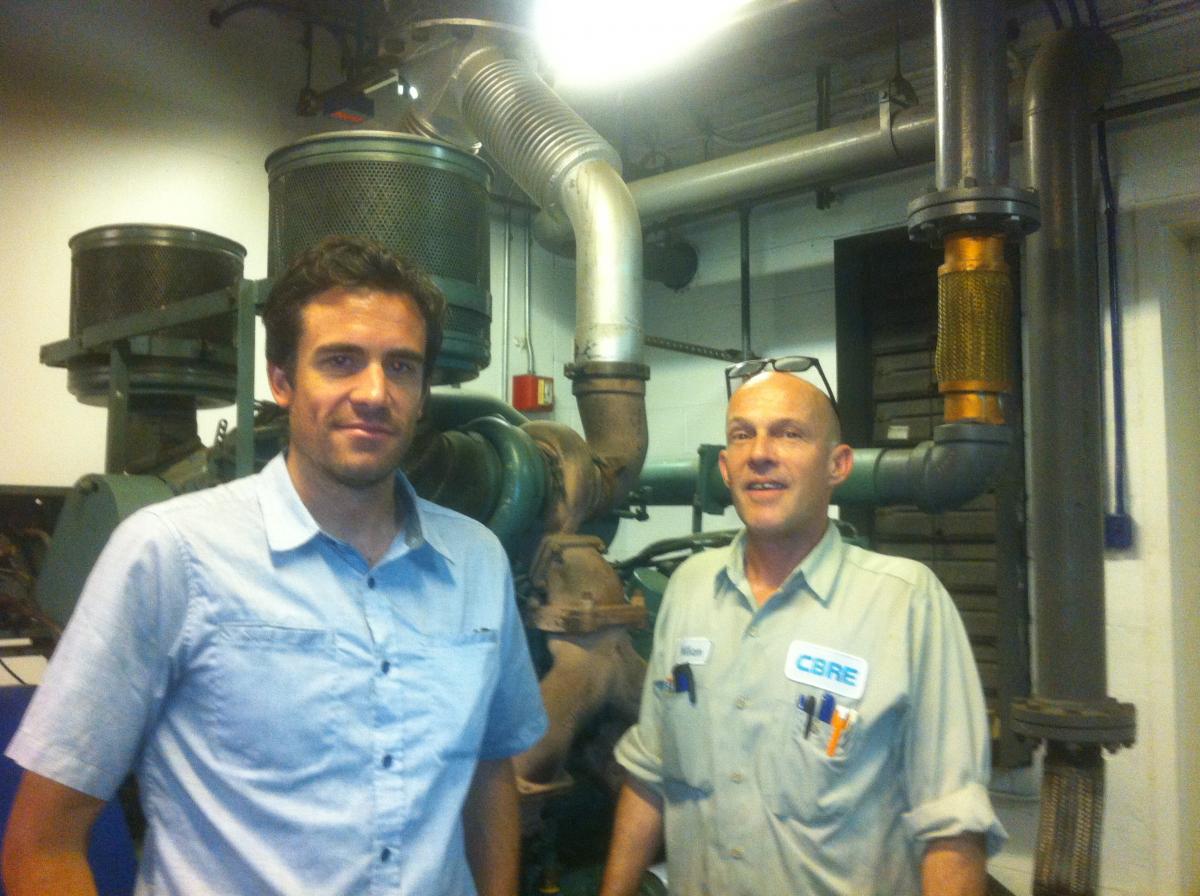EDF Climate Corps fellow | September 24, 2013
EDF Climate Corps fellows are graduate students who accept the challenge of transforming the way organizations use energy. This summer, Scott proposed LED lighting retrofits for the Eiffel Tower Experience at the Paris Las Vegas, Katrina investigated HVAC upgrades across Union Pacific Railroad, Adam worked on greening Colgate-Palmolive’s global supply chain and Nicholas looked at incentives and rebates for demand response initiatives at American International Group (AIG). Will you make an impact next summer? Apply now to be a 2014 EDF Climate Corps fellow.

Name: Scott Miller
Hometown: Los Angeles, CA
School: Columbia University
Host Organization: Caesars Entertainment, Inc.
Q: What are you working on this summer?
A: One of my projects is focused on outdoor lighting LED retrofits for high visibility areas. These areas include the exterior primary walls of the Flamingo Las Vegas and relighting the Eiffel Tower Experience at the Paris Las Vegas. It’s especially exciting because these lighting retrofits contribute to visual appeal, making it both an environmental and guest experience enhancement. I’m also working on a project aimed at reducing the energy consumption of pool, spa and fountain pumps used at Caesars Entertainment Las Vegas resorts. Ultimately, the goal is to scale-up the energy savings solutions identified in both the lighting and pump projects across all of Caesars Entertainment’s resorts.
Q: In tackling those projects, what has been the most difficult part?
A: Every single scenario is unique, so it can be difficult to record and analyze all of the desired variables. Additionally, much of the engineering aspects of the projects were new to me and required significant supplemental research.
Q: Have you found any ways that have been helpful in overcoming those difficulties?
A: For the pool project in particular, I learned a great deal from Caesars engineers, pool operators and outside vendors, and ultimately developed a pump system survey. Using this survey, I was able to identify the key data points I would need to calculate the energy, cost and carbon reduction opportunities achievable by variable frequency drive retrofits.
Q: What has been the best part for you about working at Caesars Entertainment?
A: I’ve gained tremendous insight into the complex inner workings of an enormous built environment. To work behind the scenes of a world-renowned tourist destination and its robust CodeGreen sustainability initiatives, has been unlike anything I’ve ever experienced. This fellowship has provided me with the invaluable experience of partnering with skilled technicians to identify and act upon energy efficiency opportunities, which deliver cost, carbon and energy savings benefits to Caesars, all while maintaining or enhancing the guest experience. Simply put, everyone wins.
Q: What is the mark you want to leave on the world?
A: I want to dramatically reduce the adverse environmental impacts of developed and emerging societies. I want to do that by, not only embracing technological advancements in energy efficiency, but also by reconnecting people with the importance of protecting and rehabilitating the natural systems, which support all life on Earth.

Name: Katrina Prutzman
Hometown: Boyertown, PA
School: Columbia University
Host Organization: Union Pacific Railroad
Q: Why did you join EDF Climate Corps?
A: I support the concept of making the business case for energy efficiency, and believe it is the most effective way to encourage a reduction in energy consumption and associated carbon emissions.
Q: What are you working on this summer?
A: My primary focus is looking at HVAC systems across Union Pacific’s entire network of more than 6600 buildings. I’m prioritizing where to look for energy reduction in those HVAC systems.
Q: In tackling that project, what has been the most difficult part?
A: The sheer size of the network, coupled with all the different purposes for the buildings, and the structure of how the railroad operates. Union Pacific Railroad spans 23 states, 6600 buildings, and the network is made up of multiple rail mergers. The needs of each facility and how they have been managed over time are broad and different. HVAC systems are complicated to begin with, and there is no single system or improvement that applies to all buildings.
Q: Have you found any ways that have been helpful in overcoming those difficulties?
A: Two things have been really helpful. First, reaching out to as many people as possible. Employees have a wealth of knowledge and ideas to help guide the project, and it’s been awesome to work together and see connections happen. Second, narrowing the scope of work to a few locations to use as a sample and then expanding from there.
Q: What is one thing you’ve learned this summer?
A: I’ve learned that railroads are four times more fuel efficient than trucks at transporting goods.

Name: Adam Gordon
Hometown: Los Angeles, CA
School: Columbia University
Host Organization: Colgate-Palmolive
Q: What is an interesting fact about you?
A: Before going back to school, I co-founded a startup called NYCompost that worked to develop innovative composting infrastructure in New York City. We partnered with GLAD bags to promote their new compostable trash bags and you can see me in one of their compostable bag commercials riding our compost trike around the city.
Q: Why did you join EDF Climate Corps?
A: EDF Climate Corps is a community of highly effective environmental change makers, and I wanted to be a part of that community. I am interested in a career that allows me to make business more sustainable, and I believed that EDF Climate Corps would provide me with a set of experiences and a network with which to further that career.
Q: What are you working on this summer?
A: At Colgate-Palmolive, I am working on energy efficiency and waste reduction projects to support the Global Supply Chain. I am developing a tool for the capital budgeting process to estimate the energy consumption and carbon emissions of proposed capital expenses. I am developing a resource for suppliers to help improve their energy efficiency. I am also coordinating an event at a factory to work towards creating a zero-waste facility and I will be creating material to replicate the event globally.
Q: What is the best piece of advice you’ve received?
A: The best piece of advice I have received was to leverage the knowledge of the people on the ground as much as possible. I am working from a corporate office on projects that impact facilities around the world. Greater feedback from employees will ultimately improve the tools that I develop.
Q: What has been the best part about working at Colgate-Palmolive?
A: Much of the impact that you or I have on the environment is a result of the products we consume. Normally, the best I can do is to focus on my shopping cart and reduce my impact by buying greener products and from more sustainable companies. This summer I have had the opportunity to support Colgate’s sustainability efforts by impacting the energy profile of its global supply chain. Working with a leading global consumer goods company allows me to influence far more than just my own shopping cart. I am grateful for the opportunity and inspired by the challenge.

Name: Nicolas Gordon
Hometown: Santiago, Chile
School: Columbia University
Host Organization: American International Group (AIG)
Q: Why did you join EDF Climate Corps?
A: The fellowship seemed like a great way to have an impact on leading organizations in the United States. I also was attracted to the fellowship because the work has the potential to become really big. I saw it as a great way to get hands on, real life experience in the field of energy efficiency.
Q: What are some of the projects you’ve been working on?
A: I’ve been analyzing current initiatives that the company already has a budget for but from the lens of efficiency. I’m also trying to look for new opportunities for energy efficiency in the buildings occupied by the company, through projects that can complement current efforts and which can have a visible impact. Also, I’ve been looking into available incentives and rebate programs that could apply to certain projects, an example of this are demand response programs that are available in NYC.
Q: What is one thing you’ve learned this summer?
A: I’ve learned that there is a growing concern about efficient energy and resource management, and how to be better prepared for increasing risks. The challenge is how to gain momentum and begin implementing effective measures. I’ve also learned a lot about how corporate America works.
Q: What has been the best part about working for AIG?
A: Looking ahead and realizing that, although AIG does not have a product to manufacture, tackling the energy usage in their buildings can still have a huge impact. Also, knowing that as a leader in the industry, what is implemented here could be replicated in many other companies, resulting in an even greater positive impact. Little by little we can start a ‘competition’ of trying to perform better and in a less impactful way.
Q: What is the mark you want to leave on the world?
A: By working in something I really enjoy and am passionate about, I feel like my actions can have a positive impact. We live in challenging times, but we also have more opportunities than ever before. I would like to be a part of a generational change to start living in a more sustainable and responsible way.
This post is a part of our "Interviews with Tomorrow's Leaders" series. Stay tuned for more interviews with our 2013 EDF Climate Corps fellows!
About EDF Climate Corps
EDF Climate Corps (edfclimatecorps.org) taps the talents of tomorrow’s leaders to save energy, money and the environment by placing specially-trained EDF fellows in companies, cities and universities as dedicated energy problem solvers. Working with hundreds of leading organizations, EDF Climate Corps has found an average of $1 million in energy savings for each participant. For more information, visit edfclimatecorps.org. Read our blog at edfclimatecorps.org/blog. Follow us on Twitter at twitter.com/edfbiz and on Facebook at facebook.com/EDFClimateCorps.